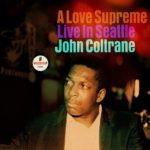A Love Supreme, arguably considered John Coltrane’s pinnacle work, first was issued in January of 1965. It was a startling, groundbreaking achievement for the saxophonist; a musical prayer signaling a tectonic shift away from the prominent jazz-as-pop scene- including Coltrane’s own contributions to the trend, such as 1961’s My Favorite Things– into more experimental and spiritual terrain. Coltrane, in his genius, could just as easily entertain with dalliances in more commercial fare, and remain an outlier and a vanguard for something new; his modal work with Miles Davis, his stylistic “sheets of sound,” and his Africa/Brass sessions, also in ’61 and marking the debut of his most illustrious solo era with the Impulse! Label, were but three of the evolutionary leaps that coincided with his concurrent and resultant steps as a popular jazz artist.
1965 would be a year for one of the bigger leaps as Coltrane debuted A Love Supreme, as an album, (scoring a bigger hit than My Favorite Things), and in concert as a complete piece. This particular performance comes from an October ’65 date at The Penthouse in Seattle. It’s a recording, according to the album’s insightful liner notes, captured by two microphones bookending the stage, feeding onto ¼” tape reels, vulnerable and fortunate to have survived 55 years. As such, it’s quite raw sonically as opportunities for any subsequent mixing of the masters is limited; drummer Elvin Jones’ prominence but one consequence.
As for the performance itself, it’s a measure of Coltrane’s exquisite acumen and predilection for daring improvisation. His legendary three supporting him are present- Jones, pianist McCoy Tyner, bassist Jimmy Garrison- as well as, on this occasion, an additional bassist, Donald Rafael Garrett, and a pair of saxophonists, Pharoah Sanders and Carlos Ward, welcomed into the ensemble. What follows is less a genteel recitation and more like 12 rounds of emotional, philosophical, and aural sparring, as the group dances with the suite as much as it uppercuts, jabs, and knocks it out.
It’s volatile and intimate, and sometimes brutal listening, but beautiful in its skill and dexterity; Tyner’s crystalline runs circuitously curling through the cacophony; Trane’s theme emerging as both an earthbound, faithful foundation and hypnotic magnet pulling upward to the heavens; his guests searching and discovering, simultaneously contributing to and benefitting from the onstage epiphany.
This is an historic set, and its existence now as a proper release will preserve it as such, but what is most alive and prevalent in this album today is how scathing and liberated it still sounds. A Love Supreme reflects a man’s spiritual gratitude amidst personal and professional quests for evolution, during a time in America rife with poverty, racial conflict, and war, over five decades ago. Yet, this provocative live performance from Coltrane and his collaborators, much like the idea of faith, is also a living art work; one that should be examined, appreciated, if perhaps not fully understood.



No Comments comments associated with this post